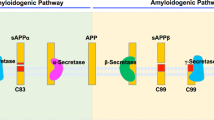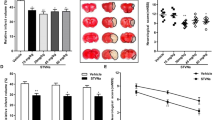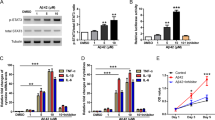Abstract
Mice transgenic for antisense Notch and normal mice treated with inhibitors of the Notch-activating enzyme γ-secretase showed reduced damage to brain cells and improved functional outcome in a model of focal ischemic stroke. Notch endangers neurons by modulating pathways that increase their vulnerability to apoptosis, and by activating microglial cells and stimulating the infiltration of proinflammatory leukocytes. These findings suggest that Notch signaling may be a therapeutic target for treatment of stroke and related neurodegenerative conditions.
This is a preview of subscription content, access via your institution
Access options
Subscribe to this journal
Receive 12 print issues and online access
$209.00 per year
only $17.42 per issue
Buy this article
- Purchase on Springer Link
- Instant access to full article PDF
Prices may be subject to local taxes which are calculated during checkout


Similar content being viewed by others
References
Costa, R.M., Drew, C. & Silva, A.J. Trends Neurosci. 28, 429–435 (2005).
Selkoe, D. & Kopan, R. Annu. Rev. Neurosci. 26, 565–597 (2003).
Yoon, K. & Gaiano, N. Nat. Neurosci. 8, 709–715 (2005).
Sugawara, T. et al. NeuroRx 1, 17–25 (2004).
Frijns, C.J. & Kappelle, L.J. Stroke 33, 2115–2122 (2002).
Wang, Y. et al. Proc. Natl. Acad. Sci. USA 101, 9458–9462 (2004).
Dovey, H.F. et al. J. Neurochem. 76, 173–181 (2001).
Milano, J. et al. Toxicol. Sci. 82, 341–358 (2004).
Ciofani, M. & Zuniga-Pflucker, J.C. Nat. Immunol. 6, 881–888 (2005).
Berezovska, O. et al. Neuroscience 93, 433–439 (1999).
Ishikura, N. et al. Proc. Natl. Acad. Sci. USA 102, 886–891 (2005).
Mattson, M.P. Nat. Rev. Mol. Cell Biol. 1, 120–129 (2000).
Prunell, G.F., Arboleda, V.A. & Troy, C.M. Curr. Drug Targets CNS Neurol. Disord. 4, 51–61 (2005).
Eagar, T.N. et al. Immunity 20, 407–415 (2004).
Pollack, S.J. & Lewis, H. Curr. Opin. Investig. Drugs 6, 35–47 (2005).
Acknowledgements
We thank H. Zhu for technical assistance and B. De Strooper for providing presenilin-deficient cells. This research was supported by the National Institute on Aging Intramural Research Program of the US National Institutes of Health.
Author information
Authors and Affiliations
Corresponding author
Ethics declarations
Competing interests
The authors declare no competing financial interests.
Supplementary information
Supplementary Fig. 1
Notch signaling promotes neuronal cell death. (PDF 637 kb)
Rights and permissions
About this article
Cite this article
Arumugam, T., Chan, S., Jo, DG. et al. Gamma secretase–mediated Notch signaling worsens brain damage and functional outcome in ischemic stroke. Nat Med 12, 621–623 (2006). https://doi.org/10.1038/nm1403
Received:
Accepted:
Published:
Issue Date:
DOI: https://doi.org/10.1038/nm1403
This article is cited by
-
MicroRNA-193a-5p Rescues Ischemic Cerebral Injury by Restoring N2-Like Neutrophil Subsets
Translational Stroke Research (2023)
-
Interleukin-1 Mediates Ischemic Brain Injury via Induction of IL-17A in γδ T Cells and CXCL1 in Astrocytes
NeuroMolecular Medicine (2022)
-
Targeting Common Signaling Pathways for the Treatment of Stroke and Alzheimer’s: a Comprehensive Review
Neurotoxicity Research (2021)
-
Exposure to PM2.5 affects blood lipid levels in asthmatic rats through notch signaling pathway
Lipids in Health and Disease (2019)
-
Preactivation of Notch1 in remote ischemic preconditioning reduces cerebral ischemia-reperfusion injury through crosstalk with the NF-κB pathway
Journal of Neuroinflammation (2019)



